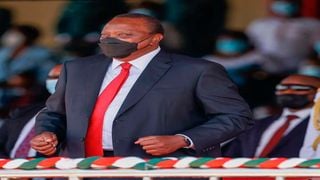
President Uhuru Kenyatta delivers his speech at Jomo Kenyatta International Stadium in Kisumu County on May 1, 2021 during Madaraka Day celebrations.
News
Premium
BBI: Uhuru Kenyatta criticises ruling, says Judiciary testing democracy limits
What you need to know:
- The president's utterances signal a looming clash over the matter that is pending at the Court of Appeal.
- A five-judge bench, on May 14, declared the BBI process null and void and opened up the President for impeachment.
President Kenyatta yesterday went on the offensive against the Judiciary over the Building Bridges Initiative (BBI), accusing judges of constitutional rigidity that is denying Kenya the opportunity to address its cyclic election troubles.
Referring to the recent High Court declaration that the government-backed attempt to amend the Constitution was illegal, President Kenyatta warned: “While I stand by the rule of law and I will always obey the decisions of the courts, I am also compelled by my position to heed the sovereign and supreme voice of the People of Kenya.”
His utterances signal a looming clash over the matter that is pending at the Court of Appeal.
The President, who spent a significant chunk of his speech on the BBI said it was far from over, describing the court order stopping the process as an attempt to usurp the will of the people.
A five-judge bench, on May 14, declared the BBI process null and void and opened up the President for impeachment by finding him guilty of failing to uphold the Constitution.
Having since filed his personal appeal against the ruling, President Kenyatta invoked what he said was the true test of freedom: the consequence of choice. This, he said, should be as much a burden on the Judiciary as it is on any other Kenyan.
“This balance [of freedom and consequence of choice] is probably most challenged by the growth of our independent institutions. Their growth has stretched our democratic boundaries to the limit; but it has not cracked them. It has bent the will of the people; but it has not broken it,” President Kenyatta said in his Madaraka Day speech in Kisumu yesterday.
While he did not speak about his appeal and those of the Attorney General, the BBI secretariat and Mr Raila Odinga, the President left no doubt that he had no intention of abandoning the process.
Constitutional limits
“From nullification of a presidential election in 2017 to an attempt to stop the will of the people as expressed through BBI, the Judiciary has tested our constitutional limits,” the President said, as Chief Justice Martha Koome, who was sworn into office less than 10 days ago, listened a few metres away on the main dais.
And just like after the 2017 presidential poll results nullification, President Kenyatta said the BBI ruling was not only dangerous, but risked courting chaos.
“In fact, any other African country experiencing the political turns and twists we have experienced in the search for greater perfection in our nationhood would have burst asunder,” he said.
Claiming a Sh1 billion loss for every hour of the 123-day 2017 election period — owing to the repeat election ordered by the Supreme Court — the Judiciary, he argued, should have been mindful of the cost of stopping the BBI process borne out of his Handshake in 2018 with Mr Odinga.
“If the field of independence has been expanded in the Judiciary, how should the field of their responsibility respond to the summons of nationhood? Shouldn’t their decisions also be accompanied by a burden of choice?” the President asked.
He added that development programmes were shelved during the 2017 election crisis because of that Supreme Court decision.
By the court deciding against the BBI, the President said, his bid to build bridges, create inclusive politics and to end ethnic majoritarianism was under threat.
“If BBI were to be stopped, who carries the burden of choice? And who will carry the burden of losing 30 per cent of our national budget every five years due to the toxic politics that BBI seeks to resolve?” President Kenyatta posed.
Broke protocol
He argued that the BBI decision elevated technicalities over the overriding objectives of law and which would deny Kenyans a chance to express their “sovereign and supreme choice” at the ballot.
“The moral foundations of justice demand that the Judiciary bears the burden of choice and the consequences thereof,” the Head of State said.
The President then turned to the political class and accused them of opposing the BBI for their own benefit. Deputy President William Ruto had celebrated the BBI ruling last month as a sign of a return to the rule of law.
“Everyone knows that BBI is good. It’s good for our country. It’s even good for those unhappy with it. They oppose BBI not because of its substance... but because, unlike our founding fathers, they cannot dare imagine a better Kenya for all,” President Kenyatta said.
In his speech, the DP avoided mentioning the BBI, but stressed constitutionalism and respect for independent institutions so as to foster the rule of law and “not the rule of men.”
Mr Odinga said the BBI was a document whose time had come.
“We want a united Kenya where no one is discriminated against. Kisumu has seen what you have done. Let us move forward to unite Kenya like we said in BBI,” said Mr Odinga, whom the President broke protocol to invite after the DP had spoken.
President Kenyatta said he and Mr Odinga will push the BBI to its conclusion.





